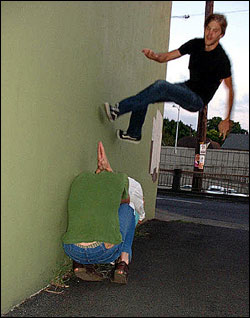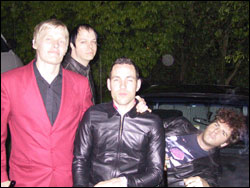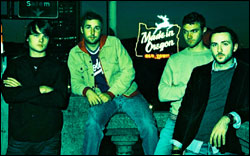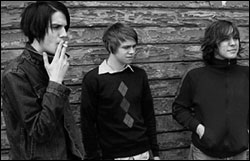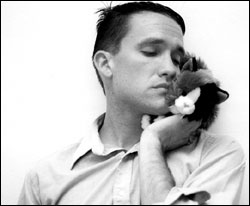If it seems that Portland-based omni-rock band Menomena came out of nowhere, you’re half right. Their freshman effort, I Am the Fun Blame Monster (an anagram for The First Menomena Album), quietly debuted last May, but within six months their mugs were plastered all over every indie rag and Web site in the nation. Although the band has gone nearly three years without a record label, distribution, a manager, or money, it’s still been tagged as the next big thing. The band members would talk about all this, but during our interview, they were too busy blushing to give an answer.
Menomena might well be the biggest band in indie rock—if only for their height. Singer and drummer Danny Seim towers over most people at 6 foot 7, but not pianist Brent Knopf, 6 foot 3, or bassist Justin Harris, who’s 6 feet even. Initially intimidating, the trio’s charming awkwardness and affability quickly win one over. Their music, on the other hand, is anything but awkward. I Am the Fun Blame Monster demonstrates an air of confidence and complexity that was initially slow to catch on. The band only sent out a few albums, one of them to Pitchfork, a popular online music magazine. Soon after, interest in the group exploded. “The Pitchfork thing was great,” says Seim. “They overlooked the fact that we didn’t have distribution, a lawyer or a publicist, or any of that industry stuff and still listened to our album. We started selling a lot of CDs from our Web site.”
The group is painfully modest when it comes to talking about their growing popularity—almost to the point of denial. “It’s weird that people think that we’re famous now or something. In our own lives, nothing has changed. We still make every CD to order by hand, and I still make copies for a living,” says Seim, referring to his day job at Kinko’s. (Knopf waits tables at McMenamins, while Harris is in college. )
Seim and Harris first met in high school; they won the West Lake Christian High School talent show playing in their self-described Pearl Jam–esque band. The two befriended Knopf, who attended Sam Barlow High School on the other side of Portland, after he was bullied into seeing one of their rock shows in 1995. “I was supposed to see this other band,” explains Knopf. “They canceled, and the club owner ‘insisted’ that I see Danny and Justin’s band.” Impressed, Knopf gave Seim a cassette of his own music. The two stayed in touch while Knopf was in New Hampshire for college. After Knopf’s graduation, in 2000, Menomena was born.
ONE OF THE most talked about features of Menomena is the group’s “fourth” member, Deeler, or Digital Looping Recorder. This is a computer program that Knopf created to record impromptu material. Most songs start out as a Deeler session, with Seim playing a drumbeat and the other members experimenting with sounds on top of it. Demo versions of the songs are recorded with Deeler in the band’s woodshed-turned-recording-studio, but then the songs are played live, reworked, and finally rerecorded without Deeler. “It gives us a bunch of raw material that we can mix together at a later date,” Knopf explains. “We don’t have to decide which parts will make the cut when we’re writing it. It’s hard to be creative and edit at the same time.”
The result is a kaleidoscope of resonant sounds with pop-tinged melodies and a foundation of hip-hop drumbeats. But the band does not use Deeler when playing live or even while recording. “People reading about Deeler think that we’re some sort of electronica or MIDI [based] band,” says Harris. “It doesn’t write music for us. It just stores it.” This might surprise people who have never seen the band live. The soulful, syncopated drumming is 100 percent organic, even when it sounds looped and almost impossible for a human to play. “At least 80 percent of the drums were influenced by hip-hop,” says Seim. “Growing up and listening to Public Enemy, I never understood the whole drum-machine and drum-loops thing. I didn’t know that there wasn’t an actual person playing those beats. I really wanted to play that way and try hard to imitate that bass-heavy and rhythmic drive that’s in the music.”
The three demonstrate a masterful grasp on how to marry dissonant sounds. Menomena’s music is wonderfully approachable and challenging in a way that other “art rock” bands strive not to be, each track an aural adventure where sharp electric guitars are piled high on top of organs and brooding bass lines. The languid, naturalistic “Twenty Cell Revolt,” featuring hand clapping, bells, alto sax, and a steady beat, contrasts with the aggressive “Monkey’s Back,” with its unrepentant drumming and a wicked-sounding Knopf vocal. Despite their differences, both songs demonstrate the band’s knack for dense layering.
To date, the band has sold more than 2,000 copies of its hand-assembled CD (each of which includes a fun flip book), and is struggling to keep up with the orders pouring in via www.menomena.com. And as they prepare for a West Coast tour, they’re also composing original music for a Portland modern-dance troupe. In an era where the Recording Industry Association of America has shown its true colors, Menomena have chosen to eschew the larger music industry for the time being. “It seems that we’ve done pretty well on our own,” says Harris. “We want to tour and reach a larger audience, but there seems to be a traditional path that bands take in order to do this. We’re not really interested in following that path, and I think that we can afford to wait.” After all, they still have their day jobs.
Menomena play the Crocodile Cafe with PrestonSchool of Industry and John Vanderslice at 9 p.m. Thurs., March 4. $10.
